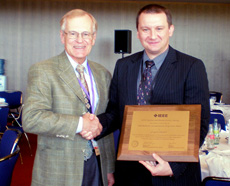Grzegorz Deptuch wins
early career award

PPD's Ray Yarema nominated Fermilab engineer Grzegorz Deptuch for IEEE's Radiation Instrumentation Early Career Award.
The IEEE Nuclear and Plasma Sciences Society has awarded Grzegorz (Gregory) Deptuch, senior engineer at Fermilab, its Radiation Instrumentation Early Career Award.
Every two years, the society presents the award and a $1,500 prize to someone who has made significant contributions to the fields of radiation instrumentation and measurement techniques for ionizing radiation within 10 years of earning their last degree.
Monolithic chips require fewer parts and are cheaper to produce. Because the pixels are smaller, they allow scientists to record the location where particles passed through a detector with greater accuracy.
"(Deptuch) is an extremely talented engineer," said Ray Yarema, the Fermilab engineer who nominated him.
When Yarema asked for letters of recommendation for Deptuch, he received double the amount needed.
"It's always a big pleasure to see that someone recognizes your work and considers it worth mentioning to others," Deptuch said.
Deptuch impressed his colleagues and superiors with his development of ways to use monolithic active pixel sensors - originally developed for use in digital cameras - in high-energy physics experiments.
"This is what I like the most: engineering meeting physics," Deptuch said. "You work on the border and achieve practical results."
Deptuch earned his master's degree in electrical engineering and his Ph.D. in electronics and physics from the University of Science and Technology AGH in Krakow, Poland, and a Ph.D. in electronis and physics from the Université Louis Pasteur in Strasbourg, France.
Many pixel sensors consist of two parts: a sensor and a readout chip. About a decade ago, during his Ph.D. research, Deptuch developed a way to integrate the two into a single monolithic structure.
"The game in high-energy physics is trying to look at smaller and smaller things," Yarema said.
Deptuch received the award at the society's annual meeting held in Dresden, Germany. Deptuch's parents, who live in Krakow, Poland, attended the award luncheon.
-- Kathryn Grim
|